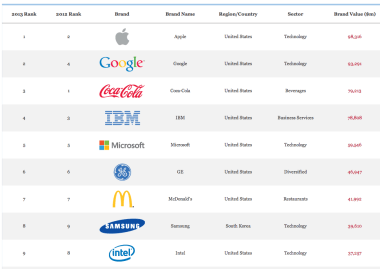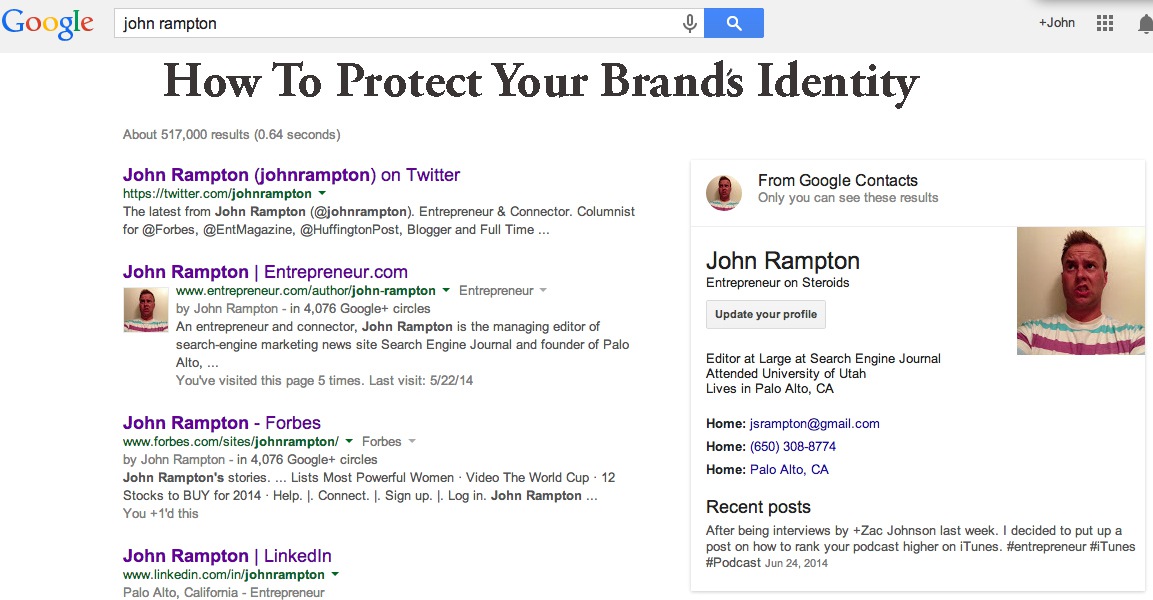As a small business owner, you’re already swamped. You’re so busy and the last thing that you want to concern yourself with is protecting the brand image and identity of the company you fought so hard to build. But, your brand’s image is one of the most important factors in determining your success. Which is why it is absolutely necessary to make sure it’s protected at all cost.
Note: I also consider my personal brand part of my overall brand and your business should consider every person that is part of your company part of your brand’s identity.
What is Brand Identity and Why is it Important?
A brand, as defined by the American Marketing Association, is a “Name, term, design, symbol, or any other feature that identifies one seller’s good or service as distinct from those of other sellers.” In short, it’s how the public views and feels about the values, products/services and personality of your brand. How important is a brand’s identity? Well, would Nike be the same without its Swoosh and “Just Do It” tagline? Would Facebook be the same if it weren’t blue? We could bore you with more examples, but you think you get the gist.
 Screenshot http://www.interbrand.com/ taken June 2014
Screenshot http://www.interbrand.com/ taken June 2014If you’ve created a great brand identity, here’s positive results you’ll see:
- Makes a great first impression.
- Distinguishes you from the competition.
- Increases brand awareness.
- Establishes brand loyalty and trust.
- Delivers the products/services you promised.
- Inspires employees.
How to Develop Your Brand Identity
Understanding the importance or brand identity is one thing. Actually developing and putting it into action is a completely different task. HubSpot put together the incredible “Marketer’s Guide to Developing a Strong Brand Identity.” Here is a brief synopsis, but we recommend you bookmark it for future reference. Before developing your identity, do some research and perform a SWOT Analysis. This will help you understand your exact place in the market. Once you are aware of the strengths, weaknesses, opportunities, and threats your company faces, you can begin to develop your brand identity, which includes five steps.
These steps are creating:
- A Vision Statement: where you want your company to be in the future.
- A Mission State: describes the purpose of your company.
- Essence: the emotions that people associate with your company.
- Personality: how does your brand speak, act, etc.?
- Position or Value Proposition: describes how your brand benefits your audience.
Once you’ve developed a strong brand identity, you can begin to create everything from logos, taglines, signs, packaging, and figure out how to market your brand so it will reach your intended market.
How to Protect Your Brand’s Identity
Now that you’ve developed an identity and created logos and slogans that clearly define your company, it’s time to make sure it’s protected.
Domains
If you want to spread brand awareness, keep customers up-to-date with the latest happenings or simply have potential customers learn more about your brand, then you need a website. Obtaining a domain name for your website is one of the most effective and cost-effective ways in protecting the identity of your brand. GoDaddy, for example, offers domain names currently for $12.99, which is a small price to pay to make sure that your brand reaches its intended audience. When choosing a domain name take the advice of Rand Fishkin from Moz. He suggests that your domain be unique, short, easy to remember, easy to type, and fulfill expectations. He also suggests that you purchase .com, .net and .org versions for branding. This will prevent anyone else from riding your coattails. Because there are so many domain names being used, make sure that it’s available, which you can do when purchasing a domain in GoDaddy or any other domain registrar. Even Google is getting in the domain game. Also keep in mind that there are now other options out there instead of just the traditional .com, .net and .org. Domains are getting very specific to include industry or location. Don’t be surprised to see everything from .club to .rentals to .vegas in the coming years.
Copyrights
If you’ve created a logo, piece or music or any “original works of authorship,” then you should have it copyrighted. This makes sure no one else can profit or display your work without consent. A copyright can also ensures another company doesn’t steal something like your logo. This will help set your brand apart from your competitors. You can learn more about copyrights and how to register by visiting the United States Copyright Office.
Patents
If you’ve invented something really unique and revolutionary, then you’ll want to get a patent. A patent can be granted to an inventor “to exclude others from making, using, offering for sale, or selling the invention throughout the United States or importing the invention into the United States.” Just keep in mind that patents have an expiration date. This means that your inventions is protected for a certain amount of years until made available to the public. Visit the United States Patent & Trademark Office for more information and how to apply.
Trademarks
Speaking of trademarks, the United States Patent & Trademark Office defines this as “a word, phrase, symbol, and/or design that identifies and distinguishes the source of the goods of one party from those of others.” While you don’t have to register for a trademark, you should take advantage of the benefits. Registering for a trademark basically puts the public on notice that this particular symbol or phrase belongs to your company. Just as with a copyright, this sets you apart from everyone else. Before registering for a trademark, make sure that it’s free to use by searching the Trademark Electronic Search System (TESS).
Legal Assistance
Everything from copyrights, patents, legal assistance to having employees sign contracts or non-disclosure agreements can get very confusing if you’re not familiar with the laws. If this is the case, then it may be worth hiring an attorney to ensure that your brand is legally protected. Before hiring a lawyer, you should brush up on legal jargon and the general rules that protect your brand. You may not have to a lawyer, at least at the time. This could be a life saver if you’re on a tight budget. But, this will also make it easier to work with a lawyer if/when needed. I suggest that you review the suggestions from a site like NOLO.com. The site provides helpful resources, such as a directory of lawyers who specialize in this field in your particular niche.
Monitor Your Brand’s Online Reputation
One of the best ways to make sure that your identity is intact is by paying attention to what people are saying about your brand online. There are numerous free tools available that allow you to analyze what people are saying about your brand, keeping up with trends and how effective your marketing campaigns are. Social Mention, TweetReach, Addictomatic, Google Alerts and this handy tool from Go Fish Digital that searches complainant sites can all be valuable assets in protecting your brand’s identity. You can also use Image Raider to discover if anyone online is using your images.
Make Sure Everyone is on the Same Page
Making sure your employees set examples for your brand is priceless. The last thing that you want is for an employee to not believe in the brand’s values or go off on a social media rant that offends people. At the end of the day, this all reflects poorly on your brand. If you don’t have the budget to hire an agency or social media manager, then at least make use of free resources like Hootsuite to manage all of your social media accounts from one location. There’s also a team management facility that can be used if several people are updating your social media accounts. Finally, make sure everyone involved in the brand delivers a consistent brand image and puts the brand first.




